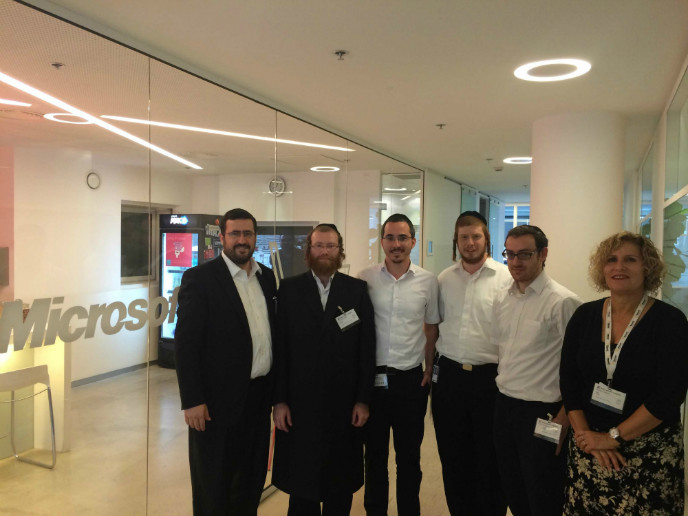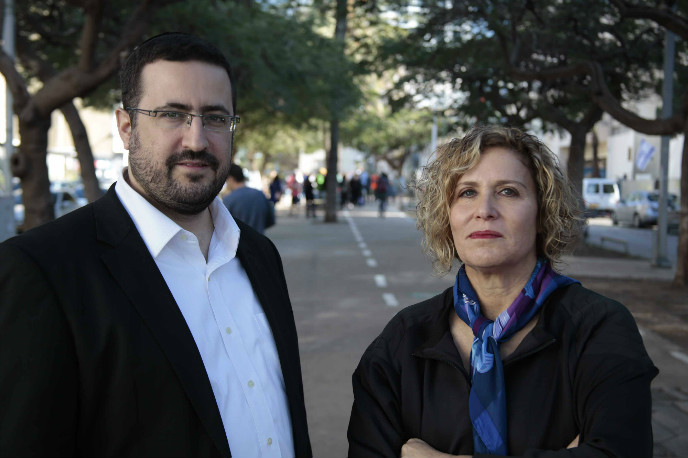
Like generations of men in his ultra-Orthodox (Haredi) family in Israel, 36-year-old Moshe Friedman never learned mathematics, science, English or any other “secular” subject.
Until age 30, he spent long hours in yeshiva studying Talmud to the exclusion of all else.
“Then I realized I wanted to explore a little bit, to know new fields and meet new people and go on new adventures,” he tells ISRAEL21c in excellent self-taught English.
“I found out that Israel is the startup nation, and I said, ‘Why shouldn’t I do that too?’”
Friedman personifies the slow but steady move toward high-tech careers among Israel’s Haredi population.
Although higher education, military service and professional pursuits still are discouraged in favor of yeshiva studies, the economic reality of supporting large families and the desire to be part of the modern tech revolution are driving a sea change in which Friedman plays a key role.
He tried for more than two years to peddle his startup idea, but couldn’t break into Israel’s entrepreneurial ecosystem.
Because Haredi men generally avoid military service, they often lack the essential personal network that most Israelis gain from the army.
“I tried to get introduced to investors, and they looked at me like I was an alien,” says Friedman.
Then he met Israel’s “high-tech godfather,” Yossi Vardi, at a startup competition. Vardi listened to Friedman’s story and said, “We secular people are very upset with Haredim because they don’t go to the army and work, but if they want to start a business we don’t help. I’d like to help you do something about this.”
Vardi introduced Friedman to Cisco executive Zika Abzuk, and this unlikely threesome decided to tackle the problem together.
In collaboration with Cisco, 18 months ago Friedman founded KamaTech to begin building a coalition of companies in Israel — including Cisco, Intel, Verisense, Google, Microsoft, IBM, Citibank, Check Point and others — willing to consider hiring qualified ultra-Orthodox engineers.
With funding from prominent Israeli entrepreneurs and the UJA Federation in New York, KamaTech also brings industry leaders to speak at member meetings.
Friedman estimates that about 12,000 Haredi Israelis are currently qualified to work in the high-tech industry.
“Most of them are not succeeding because employers don’t want to take them. But big companies need more good talent, and it should not matter if the person is Arab or Ethiopian or Haredi.” So far, nearly 2,000 Haredim have approached KamaTech.
More than 200 have found positions in companies such as Google and Check Point. “This was the first stage of the project,” says Friedman.
The second stage was kicked off in January 2015, when KamaTech launched an accelerator in the Haredi bastion of Bnei Brak – Friedman’s home and one of Israel’s poorest cities – with the enthusiastic backing of Israeli business legends including Mobileye founder Amnon Shashua.
Also partnering in this new venture is Jerusalem-based Kemach Foundation, which provides job counseling and scholarships to Haredim wishing to train for high-tech careers.
Adopting Haredi startups
In late 2014, Israel’s first accelerator for Haredi men, Yazam BaLev, opened under the sponsorship of the Jerusalem College of Technology. “KamaTech is a partner in this program and we share notes,” Yazam BaLev director Ben Wiener tells ISRAEL21c.
“We currently have 16 entrepreneurs in the program, whose ideas run the gamut from personal finance apps to innovative hardware ideas to even a potentially revolutionary solar energy generation solution.”
The idea for a KamaTech accelerator in Bnei Brak began percolating in 2013, following the success of a Haredi startup competition that KamaTech staged with Microsoft.
At the end of February, a panel of high-profile executives will choose five startups from a pool of 140 applicants.
Each will be “adopted” by an established startup — Wix, Live View, Plarium, ironSource and Yotpo.
“The big startups will get the new startups connected to the ecosystem and teach them the culture,” says Friedman.
His cousin, entrepreneur Racheli Ganot, recently opened a Haredi incubator in Bnei Brak with her colleague Yitzik Crombie. With backing from Jerusalem Venture Partners, Ganot and Crombie founded the Haredi Hi-Tech Forum two years ago and organized the first-ever high-tech conference to advance Haredi prospects in innovation and employment.
The cousins are not in competition; KamaTech’s accelerator deals with early-stage startups, while Ganot and Crombie’s incubator handles the next stage, including development support from Israel’s Office of the Chief Scientist.
Welcome to the ecosystem
When Yossi Vardi introduced Zika Abzuk to Moshe Friedman, Abzuk headed Cisco-Israel’s social responsibility team and had made strides in getting Israeli Arabs into high-tech.
She jumped at the chance to help integrate Haredim, whom she describes as “a talented, potentially wonderful workforce.” “In the Israeli high-tech industry there’s a culture of ‘a friend brings a friend,’ and the different army units are a major gateway for making contacts,” she tells ISRAEL21c.
“For Israeli Arabs and the ultra-Orthodox, even when they learn relevant professions it’s very difficult for them to fit in and get the door open. We want to be the friend to open the door for them.”
Now working in business development for Cisco – which counts about 120 Haredim among its 1,600-strong Israeli workforce — Abzuk arranges for corporate recruiters to meet Haredi job-seekers she is mentoring.
“The industry is looking for workers who are creative, curious, proactive in the way they learn, and able to work collaboratively, and this is exactly how the ultra-Orthodox study. We show that they are very good candidates.”
Abzuk says executives often worry that Haredi habits – like the reticence to mingle with the opposite sex — will clash with company culture. “However, we see that the men, especially, are very adaptive to working in a mixed environment,” she says.
“The women, when they are young and unmarried, prefer to work in a segregated mode, but when they are married and have children many are more open to working in a mixed environment in order to be part of the ecosystem and get paid as well as anyone else.”
Several initiatives in Israel are focused on high-tech opportunities for Haredi women. Temech, a non-profit organization established in 2005, developed and runs programs in professional development, soft-skills acquisition, networking and community awareness.
In collaboration with Microsoft Israel, Temech matches Haredi women with existing government and industry employment programs and develops new ones.
“It’s all about the Jewish-Israeli value of being responsible for one another,” says Abzuk. “When everyone belongs, we’ll be much more powerful as a society.”
















